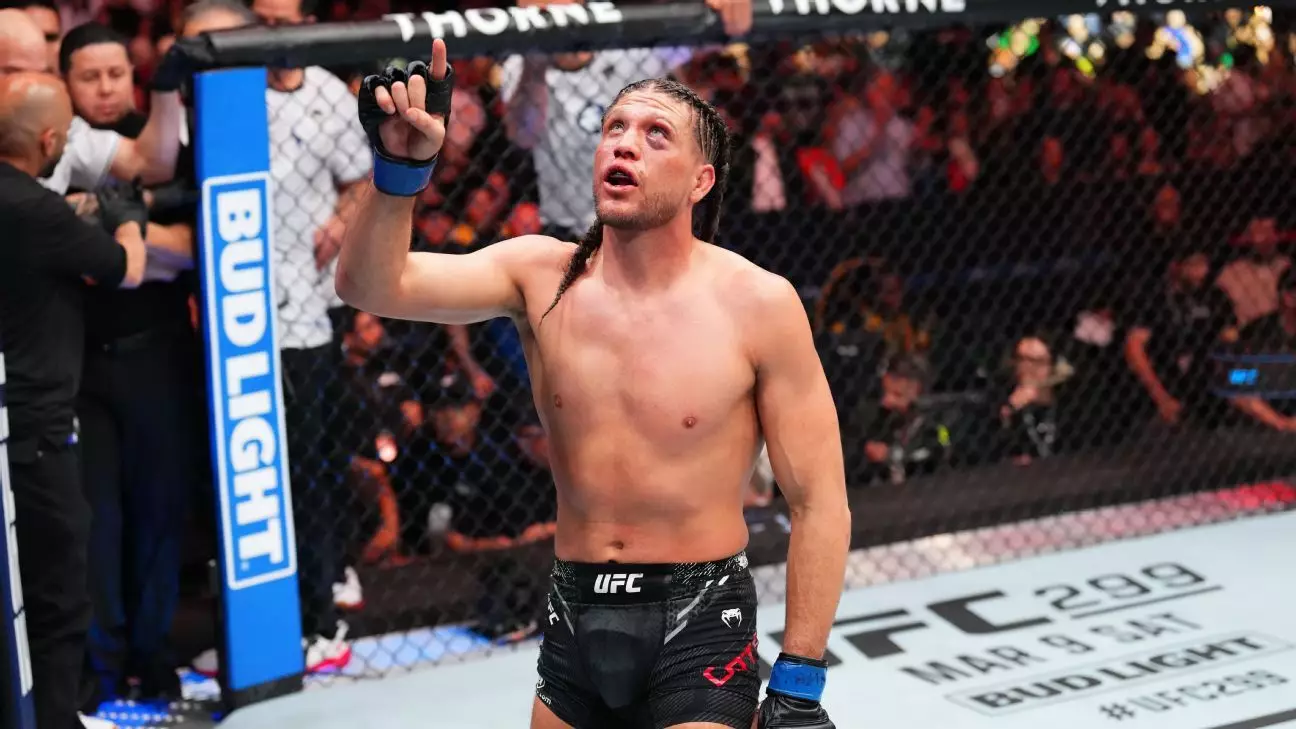Brian Ortega, a once-prominent contender in the UFC featherweight division, faces a significant moment in his career as he prepares to fight Diego Lopes at Noche UFC in Las Vegas this weekend. This matchup serves as a redemptive opportunity after a highly publicized pull-out from UFC 303 due to weight issues that could have threatened his health and career trajectory. As Ortega reflects on the events leading up to this moment, a narrative emerges that underscores the importance of prioritizing mental and physical well-being over merely securing a fight.
The original bout against Lopes was set against the backdrop of unforeseen changes when the star fighter Conor McGregor was injured, creating a last-minute opportunity for Ortega. However, the pre-fight situation escalated dramatically for him. Weighing in at 178 pounds, Ortega faced an unsustainable challenge of cutting down to the featherweight limit of 145 in a mere 15 days—a feat that was not only physically daunting but also fraught with health risks.
“A rushed weight cut can be a recipe for disaster,” Ortega shared with ESPN, echoing a sentiment that rings true across many combat sports. As a professional athlete, the pressure to compete often clouds judgment, pushing fighters to ignore warning signs from their bodies. Ortega candidly admitted he had previously been tempted to fight under similarly risky conditions. But this instance marked a significant turning point in his understanding of personal health and fighter safety.
Before the weigh-in, the fight was tentatively rescheduled for 155 pounds, but ultimately the UFC made the decision to withdraw Ortega from contention. This pivotal moment, while disappointing, proved to be a well-considered choice to protect him from possible long-term repercussions of competing in a compromised state. Ortega expressed gratitude that the UFC showed concern for his well-being when he himself couldn’t recognize the severity of the situation.
The psychology behind fighting is complex; Ortega’s struggle illustrates the tension between a fighter’s instincts and their physical limitations. “I couldn’t get out of bed that morning,” Ortega recounted, reflecting how his condition impacted his mental readiness. This honest admission reveals the grim reality many fighters face when they push their bodies beyond safe limits. While he attempted to motivate himself with scenarios of survival, such as defending his home from an intruder, the truth remained—he was not in a position to compete effectively.
The decision to abort the fight stands as a testament to the evolving culture in mixed martial arts regarding fighter health and safety. In recent years, the UFC has garnered a reputation for its cutthroat nature, prioritizing match-ups over fighter welfare. However, Ortega’s experience challenges that narrative, as he emphasized the UFC’s role in prioritizing his safety on a crucial day.
Though Ortega was not compensated for the weight cut attempt or the emotional turmoil that accompanied it, he was able to salvage some joy through a future opportunity. The chance to face Lopes on Mexican Independence Day represents a significant moment for Ortega, as he aims to reclaim his standing in the octagon with a full training camp and a commitment to his craft. “I wish things didn’t play out the way they did, but I can’t cry over spilled milk,” he stated, evoking a sense of resilience and acceptance.
The sport, rife with ups and downs, often defines a fighter’s career with moments of adversity. For Ortega, the road ahead is imbued with newfound lessons about preparation, health, and the virtues of strategic decision-making. As he steps into the cage this weekend, the weight of his previous experiences will undoubtedly influence his performance, reminding fans and fighters alike that resilience often shines brightest in adversity.
Brian Ortega’s journey serves as an important reminder of the human aspect of professional sports, where powerful narratives unfold not just in the octagon, but also in the often-overlooked realms of mental and physical health. As Ortega prepares to take on Diego Lopes, one thing is clear: this fight carries more than just stakes of victory; it serves as a testament to growth and the value of fighter safety.


Leave a Reply